For some instant stress relief why not make a cup of chamomile tea? Used as a herbal as far back as in the time of the Ancient Greeks; the lack of caffeine and light floral flavor of chamomile tea makes it perfect to drink at any time of the day.
Although there has not been much research into chamomile tea to date, what has been done looks promising. Chamomile can possibly promote better sleep, soothe digestive discomforts and support better blood sugar control in diabetics. In this article we review some of the recent scientific research into chamomile, as well as reviewing a selection of the best chamomile tea currently available.Quick Comparison: Top 10 Best Chamomile Tea
1. Traditional Medicinals Organic Chamomile
Made with pharmacopoeia grade chamomile, the Traditional Medicinals organic chamomile comes as six packs of 16 individually wrapped tea bags. As well as certified USDA organic, this chamomile is also Non-GMO Project Verified and kosher.
Naturally caffeine free, this chamomile tea contains 1300 mg of chamomile flower and has a bittersweet taste with honey overtones and a floral fragrance. Some buyers have found this tea lacking in flavor compared to some other chamomile tea and other drinkers prefer to brew two bags or brew a chamomile tea bag with a different herbal tea bag.Pros
Cons
2. Davidson's Tea Bulk, Herb Chamomile Flower
The Davidson’s organic chamomile flowers comes as a larger 16 oz foil lined pack to keep the chamomile fresh. This chamomile has a sweet and butter-like flavor although some drinkers find that even though this is German chamomile, it can still be on the bitter side. You may also find more twigs and leaves in with the flowers than you would expect and there can be a minor risk of some contaminants within this.
Pros
Cons
3. Twinings of London Pure Chamomile Tea
Suitable for brewing as a 6 oz or 8 oz cup in all Keurig brewer, the Twinings of London pure chamomile K-CUPS come as six packs of 24 cups. This chamomile is made from hand selected pure chamomile blossoms to give a smooth tasting drink with a soft floral aroma.
Some drinkers have found these K-CUPS make a very weak brew and some also consider that using a Keurig brewer is not the best way to make the most of brewing chamomile tea.Pros
Cons
4. Celestial Seasonings Chamomile Herbal Tea
The Non-GMO Project Verified Celestial seasonings chamomile herbal tea is free from any artificial flavors, colors or preservatives. This comes as a six pack of 20 individually wrapped and sustainable tea bags which are free from staples. The box is also made from recycled card.
This kosher chamomile has a sweet floral taste and delicate aroma, although it can lack some flavor compared to other chamomile bags and the lack of tags on the tea bags is a minor irritation for some drinkers.Pros
Cons
5. Bigelow Cozy Chamomile Herbal Tea
The Bigelow cozy chamomile herbal tea comes as a six pack of 20 individually wrapped tea bags (total 120 tea bags). This chamomile tea is made with whole chamomile flowers and is Kosher Parve and Non-GMO Project Verified. This tea is manufactured in the US. Some consider that although this is smooth, it does lack depth of flavor which means you may want to use two or three bags to improve its flavor.
Pros
Cons
6. Yogi Tea Comforting Chamomile Tea Bags
Made with organic chamomile flowers, the Yogi Tea comforting chamomile tea bags are also certified as free from any GMO ingredients. This six pack of 16 tea bag packs of chamomile tea is also kosher and free from any artificial flavors or sweeteners. These tea bags are not individually wrapped and as a light flavor you may want to use two tea bags per cup.
Pros
Cons
7. Stash Tea Chamomile Herbal Tea
Made with chamomile sourced from Egypt, the Stash Tea Company chamomile tea bags come as a box of 100 individually wrapped tea bags with an apple-like aroma and flavor. Some drinkers have commented that there is now a lower amount of chamomile in the tea bag than there used to be, which means you may need to use at least two per cup. This tea is not currently organic, although it is Non-GMO Project Verified. It is also certified kosher.
Pros
Cons
8. Stash Tea Chamomile Nights Herbal Tea Bags
The Stash Tea Company chamomile nights contains a caffeine-free blend of chamomile, spearmint and natural lotus flavor as 100 individually wrapped tea bags. This is a lighter flavor chamomile blend so you may need to use multiple bags per brew and not all drinkers will be as keen on the other herbals blended with the chamomile. The tea bags can also be prone to losing their strings when using. This blend is Non-GMO Project Verified and certified kosher.
Pros
Cons
9. Tealyra Egyptian Chamomile Tea
The 3.5 oz resealable pack of Tealyra Egyptian chamomile tea has a floral and sweet honey taste and is free from any added flavorings. This is an organic tea. Some buyers have found that this is more of a ‘cut’ or powdered tea rather than a whole flower tea and there can be a small risk of some contamination of the tea.
Pros
Cons
10. Nature Restore Organic Chamomile Tea
The USDA organic Nature Restore organic chamomile whole flower comes as a resealable 4 oz pack. This is a non-GMO tea which is also kosher, and third party tested. The German chamomile is either sourced from Egypt or Croatia and like a number of organic herbal teas there can be a small risk of some contamination. Although this is a whole flower some drinkers have occasionally found an excess of stems in the pack.
Pros
Cons
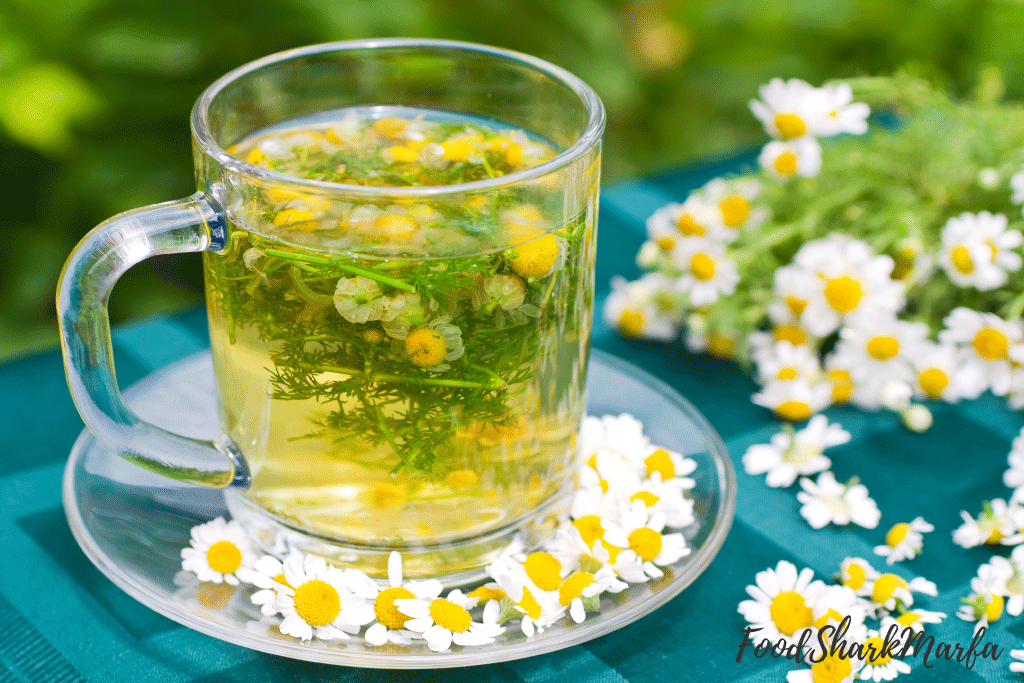
Things to Consider Before Buying Chamomile Tea
Native to Western Asia and Europe, chamomile is also grown commercially in North Africa and is found in many other countries, including the US. Naturally free from caffeine and gluten, the light floral flavor of chamomile makes it popular as an evening drink or even for afternoon tea.
Chamomile is a flowering herb which belongs to the Asteraceae family, along with marigolds, echinacea and sunflowers. The two main types of chamomile are Matricaria chamomilla or German chamomile and Chamaemelum nobile or Roman chamomile.
Use of chamomile in health is known to date back to the times of the Ancient Greeks, Egyptians and Romans. Chamomile is most often drunk as herbal tea, made from the chamomile’s flowers although it is also found in many oils, cosmetics, soaps, shampoos and other lotions.
When choosing a chamomile tea, you may want to look for one made with whole flower heads.
Chamomile Tea for Sleep Quality
Apigenin is an antioxidant which is found in chamomile tea. This molecule can bind to specific brain receptors, improve sleepiness, and cut back on some of the insomnia experienced. One study showed postpartum women who drank chamomile tea for a fortnight had better sleep than those who did not.
A second study found that those taking 270 mg of chamomile extract were able to fall asleep faster and wake up less than those who did not take the supplement. Some cardiovascular patients were also shown to have fallen asleep soon after drinking chamomile tea.
A rodent study in the laboratory showed that sleep-disturbed animals given chamomile extract were able to fall asleep; some researchers think that chamomile may be able to bind to the same receptors that benzodiazepine binds to - making it act in the same way.
Cancer
Chamomile tea may be able to prevent cancer cells from developing, or even directly target cancer cells such as prostate, breast, skin, uterus and digestive tract cancer cells. Only early research using cancer cells in the laboratory has taken place to date, so it would be some time before any conclusive findings are published.
One human study of 537 people did find that those who drank chamomile tea between two and six times per week were less likely to develop thyroid cancer than non-chamomile drinkers.
Chamomile, Diabetes and Blood Sugar Control
Chamomile has been linked with lower blood sugar levels in diabetics. Some diabetics who drank chamomile tea daily with their meals for eight weeks had significantly lower average blood sugar levels than those who drank water. Animal studies have also shown that chamomile tea can lower fasting blood sugar levels and may help prevent blood sugar spikes after meals.
Because chamomile can act as an anti-inflammatory it may be able to prevent some of the damage to the cells in the pancreas that occurs when blood sugar levels are chronically high. Like much of the research with chamomile tea, it is early days, but a potential support role to diabetics looks promising.
Heart Health
Another type of antioxidant found in chamomile tea is flavonoids. These may help reduce cholesterol levels and lower blood pressure. One study suggested that flavonoids obtained regularly from food could reduce risk of coronary heart disease deaths in elderly men.
Digestion and Chamomile
As a traditional herbal, chamomile has been used for various digestive upsets such as gastrointestinal irritation, upset stomachs and flatulence. Chamomile can be help in relieving gas and relaxing the muscles which move food through the gut.
Some animal studies showed that chamomile could help prevent stomach ulcers in rats – probably by reducing acidity in the stomach - and that it could also protect mice from diarrhea.
One study linked chamomile with reducing bouts of diarrhea in children and it was also evaluated as part of a herbal blend for treating colic in children. The chamomile and other herbals were able to eliminate colic in more children than in the placebo or control group.
Other Possible Uses
Because chamomile contains some compounds that may be able to help reduce inflammation, chamomile tea may have some benefits for other conditions such as arthritis, GI pain or even depression, all of which are linked to inflammation in the body.
Chamomile may be able to support immunity and is sometimes marketed as a herbal for preventing or treating colds and soothing sore throats.
In terms of women's health, one study showed that chamomile tea for a month could help reduce severe cramps during menstruation and the women who took part in the study also reported less distress and anxiety alongside their period pains.
There was one older study which suggested that chamomile tea may have anti-estrogenic effects and may help promote bone density. Post-menopausal women are those most at risk of loss of bone density through osteoporosis as this is linked to estrogen levels in the body.
Side Effects of Drinking Chamomile Tea
At present, there have been no reports of toxicity or life-threatening reactions from drinking chamomile tea and it is ‘generally recognized as safe’ by the FDA for most of us.
Chamomile tea is not recommended for pregnant or nursing mothers as the long-term effects of taking chamomile are yet to be established. Neither is any standard dose established. Researchers have used daily chamomile supplements of between 220 milligrams to 1,600 milligrams which equates to no more than four cups of chamomile tea per day.
Chamomile can cause sleepiness and may be able to cause vomiting if a large dose is taken.
If you are allergic to plants in the Asteraceae or daisy family, you have a greater risk of having an allergic reaction to chamomile. If you have severe allergies to other pollens, you may also want to avoid chamomile tea as it can be contaminated with other pollens and trigger an allergic reaction.
Chamomile tea should not be given to infants or young children unless advised to, as like honey, there is a small risk of chamomile containing botulism spores. Adults can fight this infection, but young children may be unable to.
Chamomile can function as a mild blood thinner as it contains coumarin. This means you should always check with your medical professional before drinking chamomile tea if you have any existing health conditions or are taking any prescribed drugs. You may also need to stop drinking chamomile tea a couple of weeks before any surgery.
Chamomile may also interact with some other herbals such as garlic, St John’s wort, valerian and gingko biloba.
Contaminants in Chamomile Tea
Particularly in organic products which do not use chemical control for pests, there can be a risk of occasional contamination by insect or other matter. The US Food and Drug Administration (FDA) publishes ‘The Food Defect Action Levels: Levels of Natural or Unavoidable Defects in Foods That Present No Health Hazards for Humans’ and contaminants such as insect fragments in foods are actually classified as an aesthetic problem.
Conclusion
Although chamomile has been used as a herbal for many centuries, there are potential health benefits which have yet to be researched in any detail and as research continues, it is expected that more positive results will emerge. There is some scientific evidence that chamomile can promote better sleep and that it may also be helpful for some digestive disorders and diabetes support.
We hope that you have enjoyed reading about chamomile tea itself, as well as some of the evidence to date around its possible benefits for health. So, whether you are looking for a caffeine-free afternoon tea, or an evening drink to soothe before bed, we trust our chamomile tea reviews have helped ease some of the stress of you having to choose the best chamomile tea for your taste and your lifestyle.
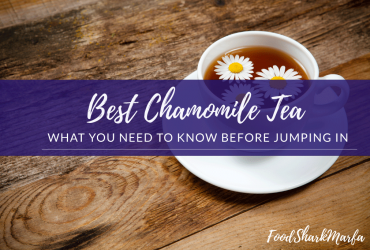
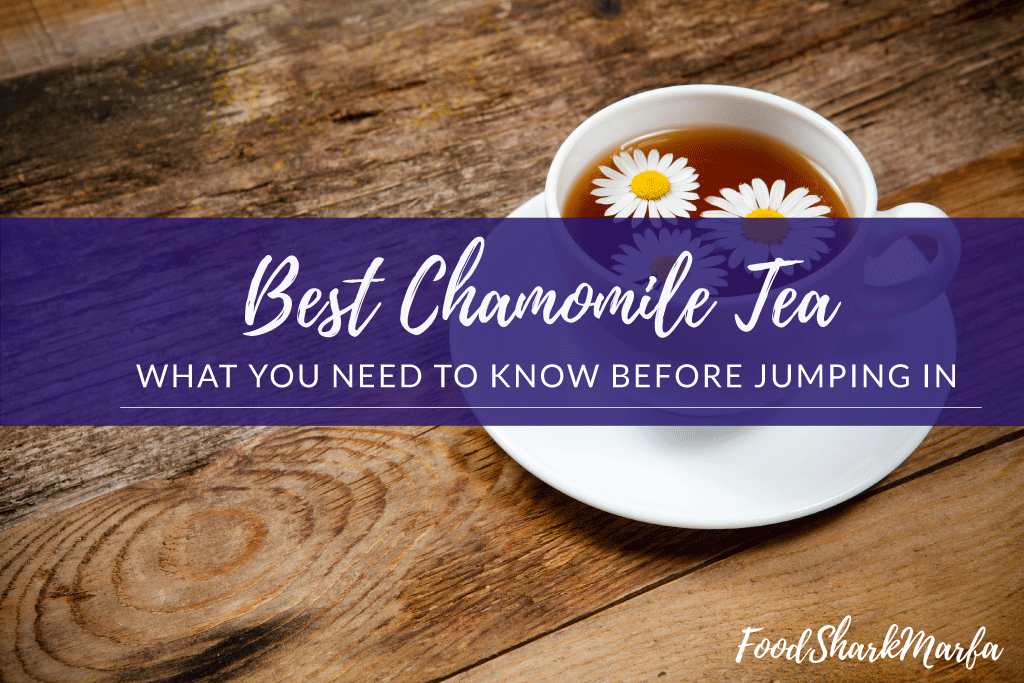
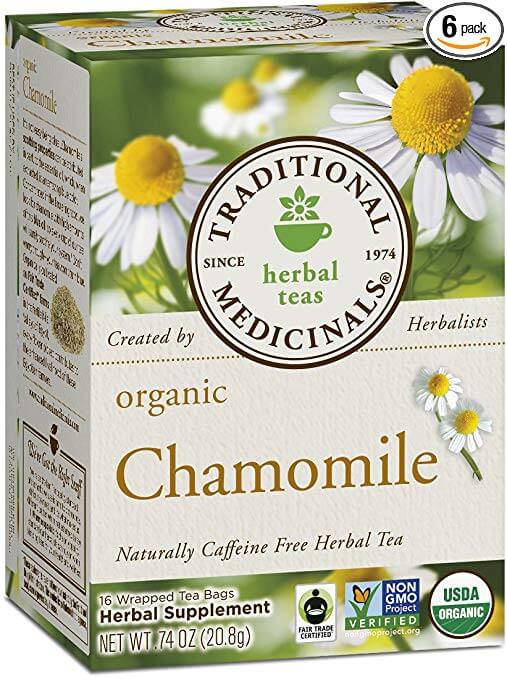
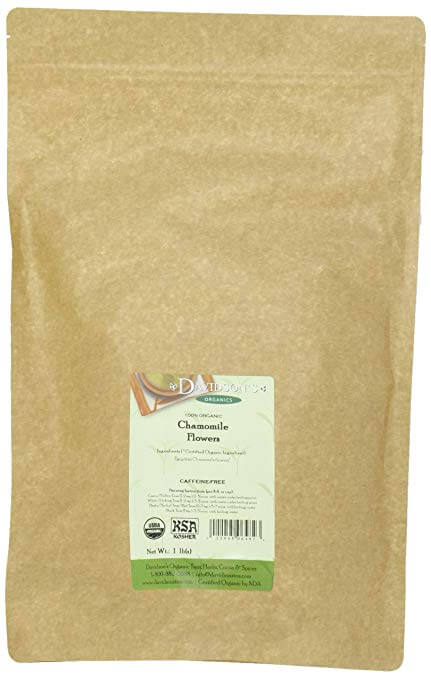
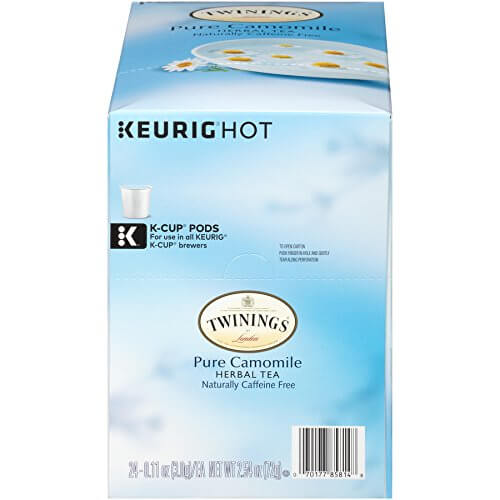
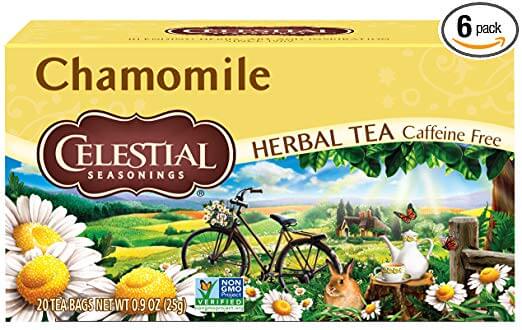
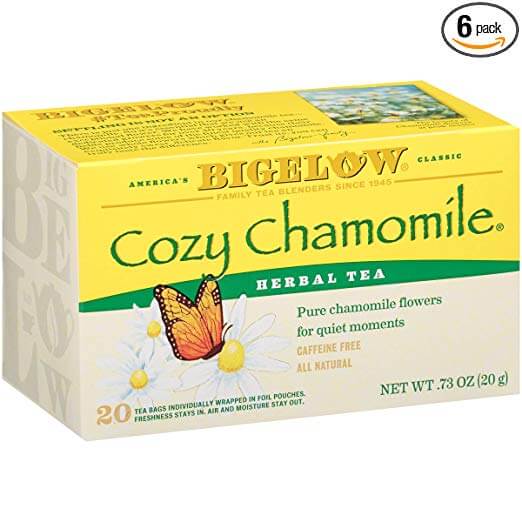
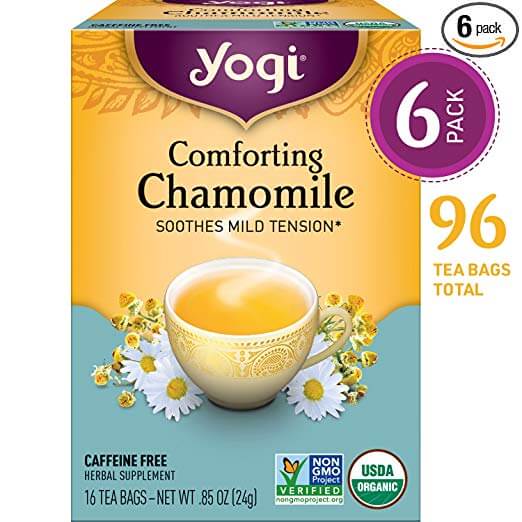
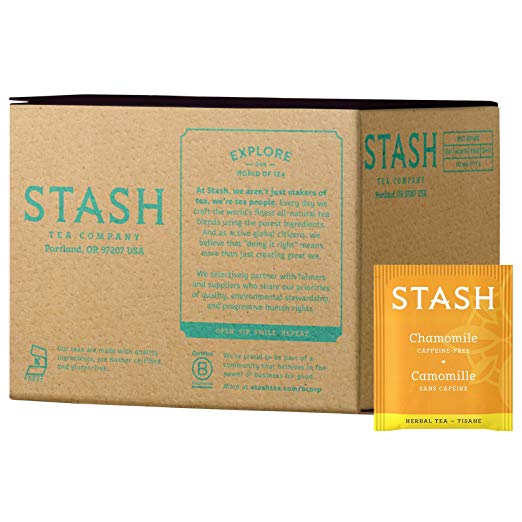
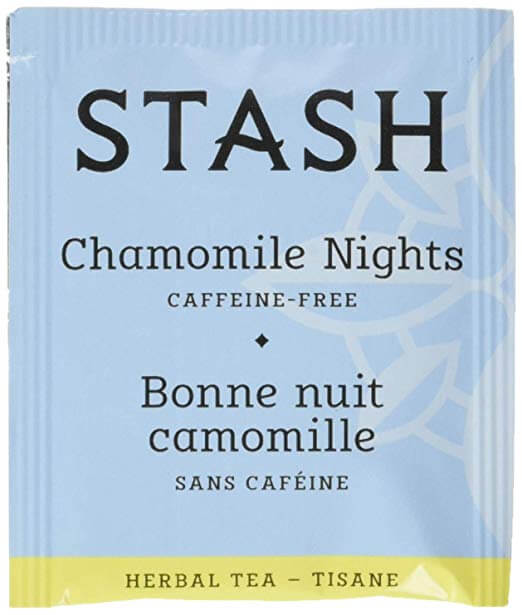
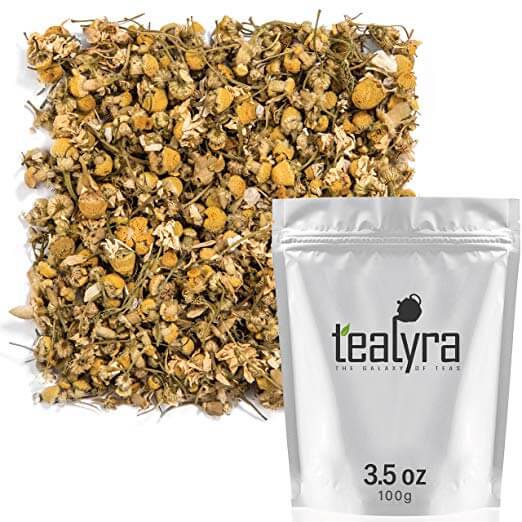
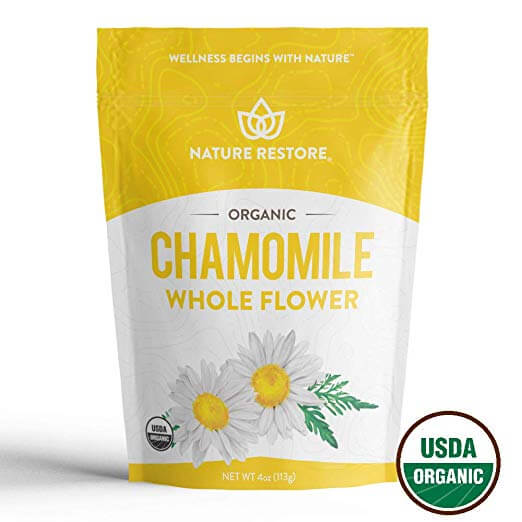

Starting my chamomile tea tomorrow. I am done with Green tea last month. I remember taking it for a week and the results were amazing. I will come back again after two weeks for feedback.